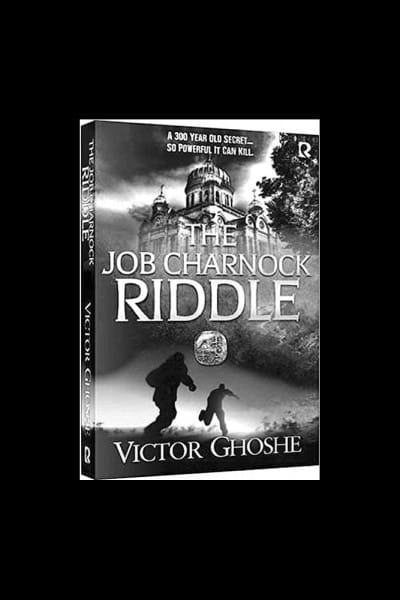If Only Job Charnock Knew!

If only Job Charnock was prescient enough to know that some three hundred years after his death a thriller would be written based on what he had supposedly done, and that, in 2003, the Calcutta High Court would reject the longstanding myth that he had founded the city of Kolkata in 1690, he might not have even set sail for India in the first place! Other things about him are disputed as well; for example, when did he die: 1692 or 1693? But such a dispute turned out to be a key ingredient of Victor Ghoshe's thriller, The Job Charnock Riddle. It is more of a "spaghetti" thriller, really, with trite cool tough guy images and actions of good guys and nasty villains battling each other in the mould of American works of the genre. The good guys are mostly Indian, and there are a smattering of British acolytes, and the villains are from various European and Asian countries. There are shoot-em-ups, all manners of special force tactics in operation, and clichéd parting shots. There is a generous dose of tough guy one-liners and overflowing hackneyed expressions as well!
A fantastic thriller first to last? Well, not quite. The story interweaves history and fiction, thereby inducing the inquisitive reader to dig for the facts. The author has declared that the research contained in The Job Charnock Chronicle is accurate, leaving the reader to wonder just where fact and fiction blur. The author has left open this possibility for the interested ones to explore, and invites them subtly to add appreciably to what appears to be docu-fiction.
The Job Charnock Riddle opens in Kolkata on 21 January 2015, and focuses on an avid young British researcher, Jenny Roberts, who "had actually dug out a great secret from the pages of history. A secret unimaginable; a secret which was hidden deep inside the layers of time and unwritten history; a secret which was powerful enough to claim several lives." She was trying to track down a treasure of seven chests reputedly filled with gold coins looted from the Governor of Bengal Shayesta Khan's treasury to be taken in the ship in which Charnock was sailing. She felt that it was now lying hidden somewhere beneath Charnock's tomb in Kolkata and so she had travelled to that city, only to be kidnapped by a formidably bad guy.
Enter the forty-year old tall, lean and angular Bengali Eric Roy, formerly an Additional Director General of the Archeological Survey of India. At present a lecturer in History at Presidency College, Kolkata, he is also a clandestine operative of The Research and Analysis Wing (RAW) of Indian intelligence, although only a couple of people knew this fact. He had been contacted by his young cousin, Aurin (who was doing post-graduate research work at Oxford University) and is told that his friend Sarah's sister Jenny had gone missing. And things start to happen now until the (almost) inevitable denouement is reached when Aurin and Sarah come to India and, together with Eric and a host of cohorts, embark on a series of harrowing adventures.
Along their adventurous path they encounter a key piece of the puzzle relating to the lost treasure, the tomb of the Armenian, Khojah Johannes, who had died in 1697, which was located in the compound of an old church whose beautiful tower, in Ghoshe's lyrical eulogy, "glittered in the moonlight like a suspended staircase to heaven." But the author also draws the reader's attention to that enigmatic and fascinating figure of Indian history, Netaji Subhas Chandra Bose. Eric lionizes him, following thereby in the tradition of his grandfather who till his dying day, "believed that if Netaji could have brought freedom to India with the INA (the Indian National Army), the face of today's Indian sub-continent would have been positively different." Here is food for thought and addas since all kinds of conclusions could follow.
The author, through Eric, offers other apposite comments on contemporary happenings: "Kidnapping, rape, murder --- everything in the name of religion and politics… and not because a section of the population is weak and another is powerful, but because the powerful section is methodically working things out so that the other section remain weak and poor. It's simply greed, greed, and more greed!" There is a dig at the Scottish through Sarah, and mention of the unobtrusive work of the cleric Father Smit, who is quite pivotal to a story with many ecclesiastical references, cryptic lines, tablets, and the Sword of God with which Archangel Michael fought Satan, mythical demons, dragons, and sea monsters. And, then, there are the Angel Warriors, a secret society founded in the ninth century with "the vengeful mission to abolish evil from heaven and earth."
Given the diverse characters, Gothic buildings, documents, secret societies, religious overtones, and lost treasure, The Job Charnock Riddle is a fast, easy and fascinating read. The denouement is not a surprise, although enough researched materials are strewn all over the narrative for the serious seeker of truth to go off on a tangent to further explore bits of colonial history. However, the narration is marred by multiple instances where events are foretold at the expense of suspense. An example: "Miraculously her prayers were to be answered in less than an hour." There are even more egregious examples of such foretelling that sap the kind of suspense desirable in works in this genre
Nevertheless, for those who relish such racy thrillers and are interested in colonial history, especially the part of Bengal history that has to do with the coming of the East India Company to Bengal, The Job Charnock Riddle will surely have some attractions! (With thanks to Waqar A. Khan, Founder, Bangladesh Forum for Heritage Studies, for bringing this book to my notice!)
Shahid Alam is an Actor, and Professor and Head, Department of Media and Communication, IUB.

 For all latest news, follow The Daily Star's Google News channel.
For all latest news, follow The Daily Star's Google News channel. 



Comments